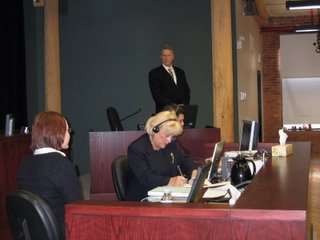
I drove down to Cornwall yesterday to get some pictures and a first story on the
Cornwall Inquiry into alleged sexual abuse in the industrial town.
Pschologist David Wolfe gave fascinating testimony about child predators, specifically the "acquaintance pedophile" who grooms his (they are over 90 per cent male, and even females usually have a male accomplice)victims, usually boys, who are most vulnerable between the ages of seven and 13.
Wolfe described how carefully and effectively these pedophiles target their victims. They might do something like leave a copy of Playboy Magazine out or offer the child a beer and see how he reacts. If the boy seems excited by this, the grooming might proceed. If the boy says, "No, I'm not allowed," the pedophile backs off.
He also said that society has been in tremendous denial about the prevalence of this kind of abuse done by prominent, often popular coaches, community leaders, teachers, priests and others in positions of authority.
He exploded the myth of the evil pedophile, pointing out that most of these people might be involved in doing genuinely good things in addition to their terrible abuse.
He distinguished between these "acquaintance pedophiles" who are seldom violent unless they are in a closed off environment like a correctional facility or residential school away from prying eyes and "stranger pedophiles" who are less numerous and far more likely to use violence.
It is not in the interest of the acquaintance pedophile to scare a child. Instead they use their position of trust with the child and his (and occasionally her, but girls are less likely to be allowed to be alone with a man) victim to lure them into sexual activity. The child cannot give consent, Wolfe said, and often is so innocent about sex that they don't understand that what the pedophile is doing is wrong.
They may come to crave having a "special relationship" with this popular community figure, and crave the money, gifts or access to adult activities the pedophile offers.
Wolfe also said that pedophiles like to have ways to ditch their victims when they reach a certain age, thus they like being in a position to have a cohort of victims that will move on as they age to another classroom, a higher level of hockey competition or whatever.
He said that men and boys have been less likely to tell about their abuse. Between five to ten per cent of the male population has suffered it.
Children who report abuse have often been blamed for tarnishing reputation of popular leaders and accused of lying. Because victims have often been vulnerable because of conflict with the law or behavior problems, their accusations have not been taken seriously.
Wolfe said protocols must be in place in institutions so that those who hear about allegations have no choice but to investigate the complaint. Previously, accusations were cloaked in secrecy and veiled in denial as perpetrators were shuffled off, usually to repeat their patterns on new victims.
Prompt and open investigations into complaints may risk tarnishing reputations, he said, but sends a message to children that this kind of sexual activity is wrong despite what the predator says, and sends a message to predators to back off.
Go
here for a complete transcript of the testimony.






